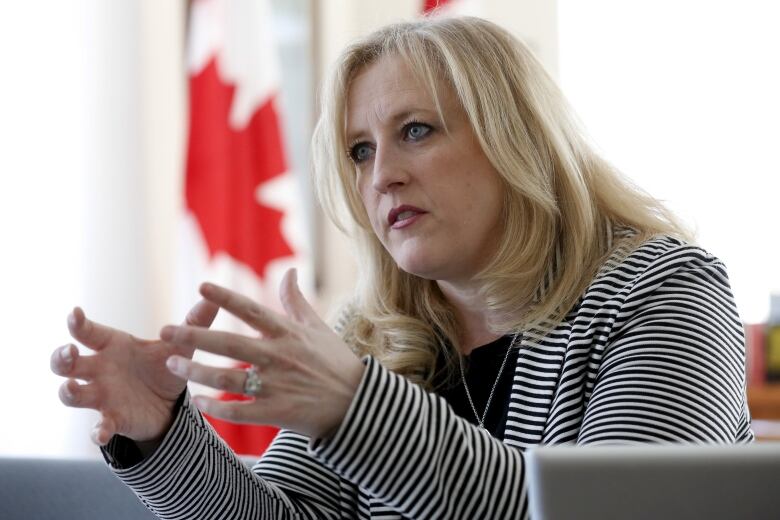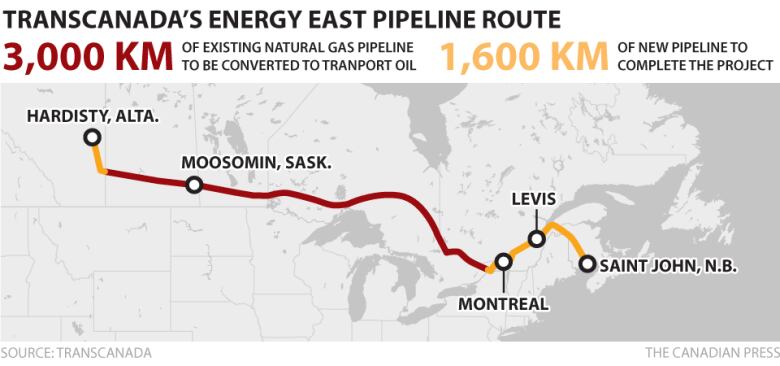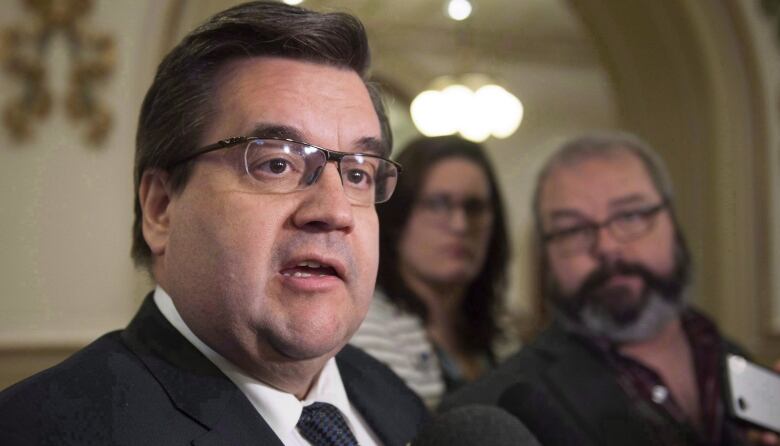It's East and West vs. the middle as energy policy once again fuels divisions: Chris Hall
Political leaders play the blame game after TransCanada abandons Energy East pipeline project

If there's one essential truth about TransCanada's proposed Energy East pipeline, it's the project's power to divide Canadians even after it's been abandoned.
The company announced this week it would no longer pursue the oil pipeline that would have carried unrefined product from Alberta and Saskatchewan to New Brunswick. It blamed delays in the regulatory process and higher costs associated with meeting the new, stricter emission standards for the decision.
Others will dissect the business case for, or against, Energy East. But the political consequences are just as important. As are the divides. This time it's not just West versus East. It's West and East versus Central Canada.
The response from provinces atboth endsof the proposed line ranged from disappointment to anger.
Federal Conservatives, with their Western base, tilted far to the latter.

"This [decision] is a result of the disastrous energy policies promoted by Justin Trudeau and his failure to champion the Canadian energy sector," deputy leader Lisa Raitt said Thursday.
"He forced Canadian oil companies to comply with standards that are not required of foreign companies. These decisions have allowed companies operating in places like Venezuela, Saudi Arabia and Algeria to ship oil to Canada with an advantage over companies like TransCanada that employs middle class Canadians."
More than half of Canada's oil imports, in fact, come from the U.S., according to the most recent report from Natural Resources Canadabased on 2014 numbers. Venezuela's not even in the top 10.
Blame game
But never mind. Natural Resources Minister Jim Carr, a Manitoban, was more concerned with putting the blame on TransCanada, market conditions and lower oil prices.
"This was a business decision," he sombrely told reporters, noting his government has approved two other pipelines under the new National Energy Board process. He rejected any suggestion his government is more open to foreign imports from countries with less stringent regulations.
"We won't be involved in a race to the bottom."
Not a race. But this country has a long history of playing politics with energy. The Liberals still can't win more than a handful of seats in Alberta nearly four decades after Pierre Trudeau's reviled National Energy Program.
'Not a good day for Canada'
The Conservatives' dominance in that province now spills into neighbouring Saskatchewan, where the oil sector plays a prominent role in the economy.
"Today is not a good day for Canada. It is not a good day for the federation. It is a bad day for the West," Brad Wall, the province's outgoing premier, said in a written statement.
"TransCanada made the decision to cancel Energy East but make no mistake, the reasons for it all fall at the feet of Prime Minister Trudeau and the federal government."
Energy East would have been a tough political sell ... especially among progressive voters in those urban ridings of Montreal.- YolandeJames,federal Liberal candidate in Montreal
In Ontario and particularly Quebec, Energy East became synonymous with risk: to waterways and natural habitat along the route, to Canada's ability to meet its international climate change commitments and, ultimately, to the political fortunes of the federal Liberal Party.
"This takes the pressure off," said Yolande James, a former Quebec cabinet minister and federal Liberal candidate in Montreal.
"Energy East would have been a tough political sell. There was no pathway that I could see for a political win, especially among progressive voters in those urban ridings of Montreal."

Those ridings, and others in the two Central provinces, matter far more to the Liberals with an election still two years away.
Alberta and Saskatchewan offer limited political upside even if Energy East went ahead with all its construction jobs and potential for economic activity.
At the other end of the proposed pipeline, in New Brunswick, the Liberals already hold all 10 seats. As CBC polls analyst ric Grenier points out, there's serious potential for some losses, but a friendly provincial Liberal government lessens the opposition inside the province.
There's far more to be lost (or gained) in Ontario and Quebec.
Opposition to Energy East runs strong in many urban centres of Quebec where Liberal support is heavily concentrated. Mayors like Denis Coderre in Montreal, a former Liberal MP, led the charge.
"We are against it because it represents significant environmental threats and too few economic benefits for greater Montreal," he said back in January of 2016.

On Thursday, he took large doses of credit for TransCanada's decision.
"It's a major victory."
Coderre's victory dance went over poorly in Saint John, N.B.
"This was an opportunity for our country to come together and we failed. How would he feel if we blocked Bombardier?" Mayor Don Darling wrote.
Political possibilities
Grenier says polls suggest the Liberals have the potential to pick up 10 to 20 more seats in Quebec. It's still no guarantee, but now there's far less chance of having Coderre and provincial politicians attacking the federal Liberals' credibility for allowing another pipeline to proceed while claiming to care about climate change.
The end of Energy East could also deprive the NDP, and new leader Jagmeet Singh, of some of the oxygen needed to undermine the Liberals' claim to being more progressive on environmental issues.
Polls, of course, are only a snapshot in time. The real impact, both politically and economically, of Energy East's demise could take weeks or months to sort out.
Until then, a pipeline that was supposed to connect oilfields in the West with refineries in the Eastserves as a reminder that energy policy in this country has a long history of fuelling divisions.












_(720p).jpg)


 OFFICIAL HD MUSIC VIDEO.jpg)
.jpg)



























































































